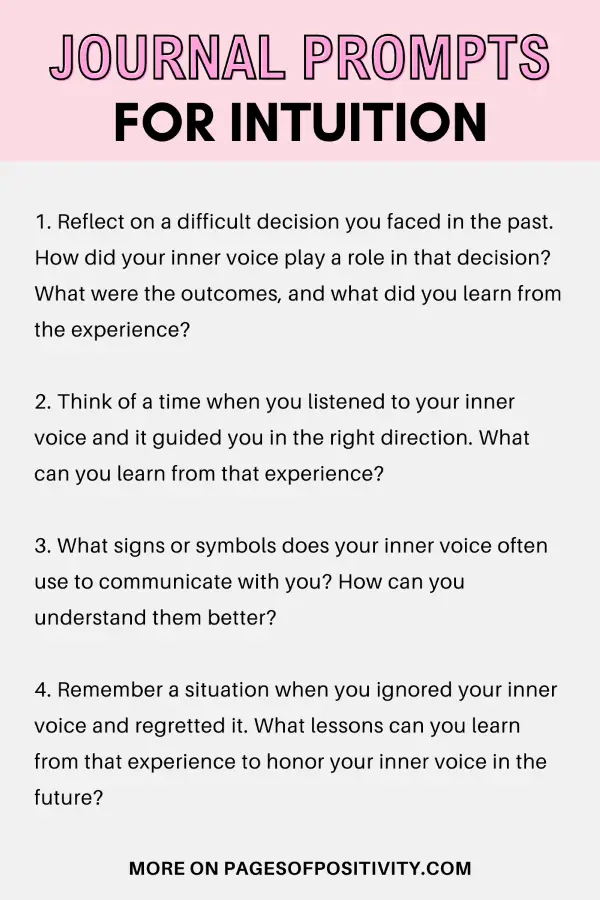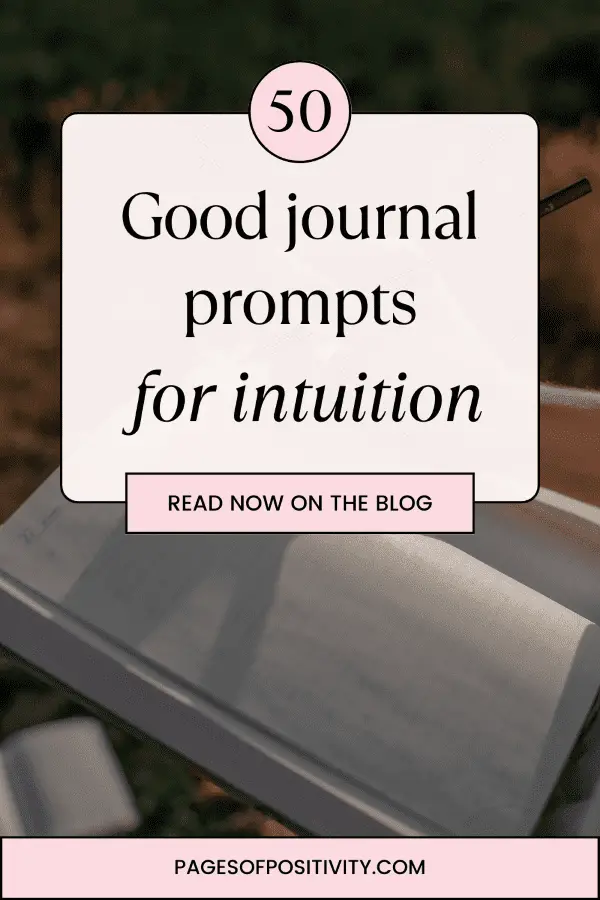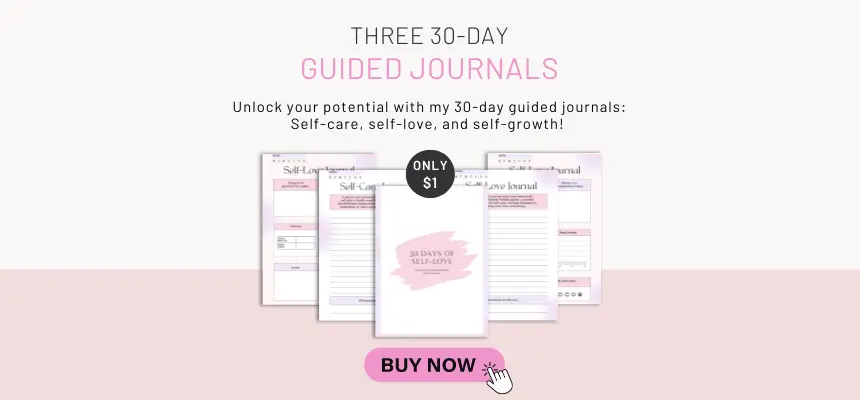It’s time to do some intuitive journaling
I’m excited to dive into a topic that’s close to my heart: journal prompts for intuition.
Do you know that gut feeling you get when something just feels right or wrong? That’s your intuition at work, guiding you through life’s twists and turns.
And guess what? Journaling can be an incredibly powerful tool for tapping into and nurturing your intuition.
So, grab your favorite notebook and a cozy cup of coffee, because we’re about to embark on a journey of self-discovery and inner wisdom. Let’s get started!


This post may contain affiliate links. That is, if you click on a link and buy something I recommend, I will receive a small compensation at no additional cost to you.
50 intuition exercises
25 intuition journal prompts
- What does your inner voice feel like in your body? Describe the physical sensations that arise when your intuition speaks to you.
- Think of a time when you listened to your inner voice and it guided you in the right direction. What can you learn from that experience?
- What signs or symbols does your inner voice often use to communicate with you? How can you understand them better?
- What recurring themes or patterns have you noticed in your inner voice’s guidance? How can you use these patterns to make better choices?
- If your inner voice could give you one message right now, what would it be? Write it down and think about its meaning.
- Remember a situation when you ignored your inner voice and regretted it. What lessons can you learn from that experience to honor your inner voice in the future?
- Take a moment to close your eyes, take deep breaths, and think about a current challenge or decision in your life. What insights or guidance come to mind from your inner voice?
- What fears or doubts often hold you back from fully trusting your inner voice? How can you overcome them and have more confidence in your inner voice?
- Think about a time when your inner voice contradicted logical thinking or advice from others. What happened, and what can you learn from that experience?
- Describe a recent dream or vivid image that stood out to you. How can you understand its meaning and any messages it may hold?
- Write a letter to your inner voice, expressing gratitude for its guidance and asking for clarity in a specific area of your life.
- Think about the concept of “gut feelings” and inner guidance. Recall a time when you followed your gut instinct, and it turned out to be accurate. What did you learn from that experience?
- Spend time in nature or visit a peaceful place. Notice any insights or connections that come to mind, and write them down.
- Imagine meeting your future self, who has made decisions based on inner guidance. What advice and guidance would they offer you?
- Reflect on a difficult decision you faced in the past. How did your inner voice play a role in that decision? What were the outcomes, and what did you learn from the experience?
You might also like: The best self-care journal prompts to try this week
- What thoughts or influences have made it hard for you to trust your inner voice? How can you let go of those thoughts and embrace your inner wisdom?
- Write a conversation between your logical mind and your inner voice. Talk about their perspectives and find a way to make balanced decisions.
- Think about a time when you strongly felt that you should do something, even if it didn’t make sense or seemed unsure. What happened when you trusted that feeling? How did it shape your life?
- Reflect on a big event or moment that changed your life. How did your inner voice guide you during that time, and what did you learn from following its guidance?
- Write about a difficult relationship or situation. What can your inner voice tell you when you think about it from a deeper, intuitive perspective?
- Imagine a day where you completely trust and follow your inner voice in every decision. Describe how that day goes and how it makes you feel happier and more content.
- Write about a time when something coincidental or meaningful happened that felt guided by your inner voice. What message or lesson did you learn from that experience?
- Reflect on a time when you didn’t listen to your inner voice and faced negative consequences. What can you do to value and listen to your inner voice more in the future?
- Describe a time when you felt a strong connection to someone else, like a friend or family member, through your inner voice. How did that connection deepen your relationship or help you support them?
- Take a moment to sit quietly and calmly. Close your eyes, take deep breaths, and ask your inner voice to share any important messages or insights with you. After your quiet time, open your journal and write down any thoughts, feelings, or images that came to you during this peaceful connection with your inner voice.

25 intuitive writing prompts
- Write a letter to your future self, asking for guidance and advice on a specific part of your life.
- Think about a dream you had recently that you remember well. What things or feelings stand out to you? How might they relate to your life right now?
- Imagine you have a mentor who is very intuitive. Describe their qualities and the helpful things they would say to you when making decisions based on intuition.
- Remember a time when you had to make a tough choice and you trusted your intuition. How did it feel? What good things happened, or what did you learn from it?
- Sit outside and pay attention to what you see and feel in nature. Choose something like a tree, a river, or the wind, and write about what it can teach you about intuition.
- Make a map of your thoughts about a problem or decision you’re facing. Use your intuition to come up with different ideas and solutions.
- Write a conversation between your intuition and your fear. Give each one a voice and show how they have different opinions about a situation. Find a way to balance their views.
- Think about a time when you knew how someone else was feeling or what they needed through your intuition. How did you act on that intuition? How did it affect your relationship?
- Close your eyes and imagine a door in your mind. What does this door mean when it comes to your intuition? Describe what you see and how you feel when you open the door.
- Think of someone you admire who is really good at using their intuition. Write them a letter to say how much you admire them and ask for advice on how to grow your own intuition.
- Remember a time when your intuition warned you about something dangerous. What did you do? What did you learn from that experience?
- Take some deep breaths and ask your intuition to show you a symbol or image that represents your inner wisdom. Draw or describe the symbol, and think about what it means.
- Think about a time when you didn’t trust your intuition and later regretted it. What happened because of that? What did you learn?
- Write without stopping or judging your thoughts, letting your intuition guide your pen.
- Think about a decision you need to make right now. Close your eyes, connect with your intuition, and write down the first word or phrase that comes to mind. Think about what it means and how it can help you make your decision.
You might also like: The only journal prompts for healing your inner child that you need
- Imagine you’re in a peaceful garden with many different plants and flowers. Pick one plant that represents your intuition. Describe how it looks and what it can teach you.
- Think about a time when you learned something important from a random conversation, a book, or a song. How did it match what your intuition was telling you? How did it affect your life?
- Write a letter expressing love and thanks to your intuition. Tell it how grateful you are for its help and how it has guided you.
- Sit quietly and ask your intuition to show you a hidden passion or dream. Write down any thoughts or feelings that come up and think about how you can make them part of your life.
- Think about a difficult relationship or argument you had. How did your intuition help you understand it? How did it help you solve the problem?
- Make a list of 10 small things you can do every day to strengthen your intuition.
- Imagine you have a wise and intuitive animal friend. What kind of animal is it? Describe its qualities and the lessons it teaches you.
- Remember a time when you got a message or insight from art, like a painting or a song. Describe the art and what it told you.
- Write about a big decision you made because of your intuition. How did it feel to trust your intuition? How did it change your life?
- Imagine that you can be someone you really admire who is very intuitive. Write about what it feels like to be them and how it helps your own intuition.

FAQ: Why should you journal?
Let’s explore why journaling is a fantastic practice for honing your intuition. Picture this. Journaling is like having a heart-to-heart conversation with yourself on paper.
It’s a safe space where you can freely express your thoughts, dreams, fears, and desires without judgment or interruption. Journaling allows you to slow down, reflect, and tap into the depths of your inner world.
Journaling can help you get closer to your inner voice, called your intuition. Your intuition knows what’s right for you, even when the outside world says differently.
When you write in your journal often, you open up a way to connect with your intuition and get important insights.
As you write down your thoughts and experiences, you start to see patterns, themes, and hints from your intuition.
Maybe you find a special phrase, a clear picture, or a feeling that stands out. Journaling gives you a chance to explore these intuitive messages and understand them better.
When you revisit your journal entries later, you can find connections and see patterns. It helps you gain insights and understanding.
You’ll gain a deeper understanding of yourself. It’s like having a personal compass that guides you toward alignment and fulfillment.
For instance, let’s say you’ve been feeling stuck in your career. By journaling about your passions, strengths, and values, you can uncover insights that point you in a new and exciting direction.
Your journal becomes a supportive friend. It helps you navigate life’s crossroads and make choices that resonate with your authentic self.
So, whether you’re seeking clarity, exploring your emotions, or simply curious about your inner world, journaling is a powerful practice to cultivate your intuition.
You might also like: Good journal prompts for anger management
FAQ: What is intuitive journaling, and how does journaling help intuition?
It’s a way to engage in a deep conversation with your inner self and tap into the innate wisdom that resides within you.
By incorporating intuitive prompts and techniques into your journaling practice, you can strengthen your connection to your intuition and receive valuable guidance in various aspects of your life.
Let’s explore how journaling helps develop your intuition.
When you journal, you create a special space for reflection and self-expression. Taking this time allows you to connect with your inner voice or intuition. It’s like turning up the volume on your soul’s whispers.
As you write freely, you uncover insightful gems. Journaling helps you access deeper layers of consciousness, going beyond the distractions of daily life.
By journaling, you tap into your subconscious mind, which holds intuitive guidance. This guidance can help you make aligned choices and decisions.
Besides, journaling provides a tangible record of your thoughts, experiences, and intuitive nudges. You create a personal treasure of wisdom to refer back to when you need guidance.
Writing itself can also spark intuition. It engages both your logical mind and your creative, intuitive side.
The rhythmic motion of writing can be calming and help you enter a state of flow. In this state, intuitive insights effortlessly emerge. It’s during these moments of flow that your intuition can speak the loudest.
To enhance the connection between journaling and intuition, you can incorporate specific journal prompts for intuition into your practice.
For example, you can start by simply jotting down any thoughts, sensations, or images that come to mind.
You can also ask open-ended questions like, “What does my intuition want to tell me today?” or “What is my heart yearning for?” These journaling prompts invite your intuition to step forward and provide guidance and clarity.
You might also like: The best new month journal prompts to help you set good goals
FAQ: The best tips for connecting to your intuition
Connecting to your intuition is like strengthening a muscle; it takes practice, patience, and a nurturing approach. Here are some tips to help you cultivate a deeper connection with your intuition through journaling and beyond:
Create a sacred space
Find a cozy and quiet spot where you feel comfortable and free from distractions. It could be a corner of your home, a peaceful park, or even your favorite café.
Set the mood with soft lighting, calming music, or any other elements that make you feel at ease.
Embrace stillness and silence
Intuition often whispers in the quiet moments of our lives. Take a few deep breaths, settle into the present moment, and allow your mind to quiet down. This opens up space for your intuition to be heard.
Practice active listening
Intuition speaks in subtle ways, so it’s important to tune in and actively listen. Pay attention to the sensations in your body, the images that come to mind, and the feelings that arise.
Be open and receptive to the messages that your intuition may be sending you.
Trust your inner voice
Trust is a crucial element in connecting with your intuition. Trust that the messages you receive are valid and valuable.
Release self-doubt and embrace the knowing that comes from within. Your intuition is a wise and reliable guide.
You might also like: Practical journal prompts for jealousy to help you heal
Start with simple questions
Start your journaling exercise by asking yourself gentle, open-ended questions. For example, “What am I feeling in this moment?” or “What do I need to let go of to move forward?”
Allow your intuition to respond naturally, and let your pen flow without judgment or censorship.
Engage your senses
Connect with your intuition by engaging your senses. Write about the sights, sounds, tastes, smells, and textures that inspire you.
Describe how they make you feel, and pay attention to any intuitive insights that arise during this sensory exploration.
Incorporate intuitive writing prompts
Use specific journal prompts for intuition designed to enhance your intuitive connection.
For instance, “If my intuition had a voice, what would it say?” or “What does my intuition want me to know about a particular situation?”
These intuition journal prompts encourage your intuition to step forward and guide your writing.
Trust your instincts
Intuition often shows up as a gut feeling or a hunch. Trust those instinctual nudges and act on them when it feels right. Journaling can help you gain clarity and confidence in following your intuition’s guidance.
Did you find any journal prompts for intuition that you liked?

I consider myself an expert when it comes to positive affirmations, journaling, and inspirational quotes. My blog is all about spreading good vibes and helping you feel awesome! I’ve got loads of cool stuff for you to explore, like uplifting affirmations that can boost your confidence, fun journal prompts to spark your creativity, and inspiring quotes to motivate you every day. Let’s embark on this amazing journey together as we discover more about ourselves, uncover our hidden strengths, and create a life that’s full of happiness and success.







